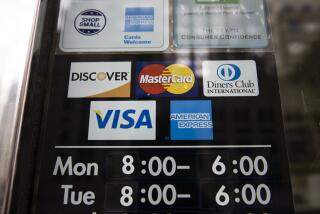Chase makes it easier for consumers to overspend
If there’s an upside to these seemingly endless economic doldrums, it’s that consumers have gotten a whole lot savvier about managing their money.
Case in point: We’re carrying less debt. The New York Federal Reserve reported this week that consumer debt had dropped by $60 billion in the most recent quarter as households “deleverage” to cope with tough times.
So how are some banks responding? They’re making it easier for people to run up balances on their credit cards.
In other words, they’re trying to get people to once again bury themselves in debt.
Case in point: Chase Freedom MasterCard holders are receiving notices that in addition to new benefits, their cards are being automatically switched from having credit limits to credit access lines — unless customers opt out of the change.
What’s a credit access line? Good question.
“A credit limit sets a specific amount an account can borrow,” Chase’s notices explain. “With a credit access line, you have the ability to charge over your credit access line and not be charged an over-limit fee. You can revolve, or carry from month-to-month, transactions adding up to your total credit access line.”
Huh?
I asked Paul Hartwick, a Chase spokesman, to read that passage and tell me if it allows customers to make an informed decision about whether switching to a credit access line is a good thing.
“We could certainly have written this in a clearer manner,” he acknowledged.
Hartwick declined to say how many Chase cardholders are receiving the notices. He said only that they were sent to “customers who we believe would find value in the new features and benefits.”
The bottom line, according to Hartwick, is that changing from an old-fashioned credit limit to a newfangled credit access line will allow you to borrow more money more easily.
“A credit access line means that you may be able to go over your credit limit without any over-limit fee,” he said. “It gives you the ability to spend.”
Chase and other card issuers are painfully aware that as the economy slowly works its way back into the sunlight, consumers are keeping a tighter rein on their spending and cutting back on debt.
David Robertson, publisher of the Nilson Report, an influential credit-industry trade journal, said card issuers want to reverse this trend by making it simpler — and thus more attractive — for consumers to borrow money.
“A credit access line does that,” Robertson said. “It makes it as easy as possible for people to decide to borrow.”
That’s because a credit access line puts more money at your fingertips. A traditional credit limit typically means a transaction will be denied, or fees will be imposed, if you surpass your borrowing cap.
But with a credit access line, your limit becomes a moving target.
There are rules, of course, and Hartwick said that if you had a credit limit of $10,000, you probably wouldn’t be able to go out and charge a $20,000 car with a credit access line.
But if you had a credit limit of $10,000 and wanted to purchase a $12,000 home entertainment system, a credit access line probably would allow you to do so without any difficulty or penalty.
Will cardholders know when they’ve surpassed their credit limit?
“The individual would not know that,” Hartwick admitted.
Along with enticing people to take on bigger balances, the “upgraded” cards are dropping the Master RoadAssist benefit, meaning that you’ll no longer be able to rely on your Chase card if your car breaks down.
It’s not all bad news, though. The new cards will boast travel benefits such as accident insurance and lost-luggage reimbursement, plus special shopping discounts and entertainment perks.
“Chase’s focus is not getting people to spend more,” Hartwick said. “We simply want customers to choose to do more of their spending with us.”
If that were the case, though, the bank could have offered other incentives, such as lower interest rates. A credit access line aims solely to increase borrowing.
It’s a way to get people deeper into debt just as many households are at last making wiser decisions about their finances.
Chase is giving customers the ability to reject the change and stick with traditional credit limits. This may be a situation where it’s best to just say no.
David Lazarus’ column runs Tuesdays and Fridays. He also can be seen daily on KTLA-TV Channel 5. Send your tips or feedback to david.lazarus@latimes.com.
More to Read
Inside the business of entertainment
The Wide Shot brings you news, analysis and insights on everything from streaming wars to production — and what it all means for the future.
You may occasionally receive promotional content from the Los Angeles Times.











